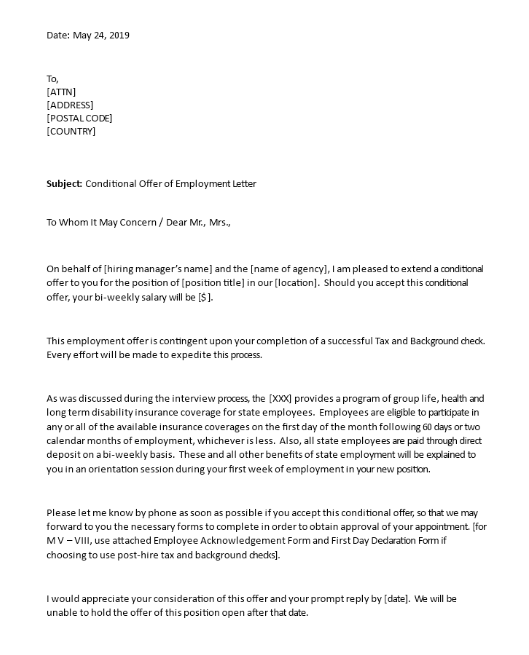

You’d be forgiven for thinking a job offer is either a straight-up ‘yes’ or ‘no’ – and most of the time it is as simple as that. However, there are other times that you might receive a conditional employment offer – but what does that mean? Well, we here at 4 Day Week have everything you need to know.
Whether you've received a conditional job offer yourself or you've seen the term written somewhere on your job search, here’s our official 101 on conditional employment – we’ll explain everything from the best ways you can respond, to the different requirements you might be asked to carry out.
A conditional offer of employment is a job offer contingent on the candidate meeting specific conditions set by the employer. These conditions often include passing a background check, providing proof of identity or qualifications, and sometimes undergoing a drug screening. Notably, 95% of employers conduct background checks, making this a common condition for employment.
If you do get a conditional offer of employment, it’s usually because they want to hire you but they need some further information from you before you officially join the team. So in other words, conditional offers are a good sign you’ve got the job – but not a reason to celebrate properly just yet.
Conditional job offers typically include various requirements tailored to the company and role. Common conditions include drug screenings, physical examinations, verification of certifications or qualifications, reference checks, criminal record checks, and occasionally, credit checks. For instance, bank jobs often require credit checks, while construction roles may necessitate drug screenings.
To give an example, applicants for a job role at a bank should expect to have a credit check, especially if their job involves giving financial advice. Likewise, construction jobs involving handling heavy-duty machinery will likely require you to have a drug screening before you officially start.
Just don’t panic too much about the credit checks. Let’s say a company asks to run a credit check during the hiring process – rest assured they won’t actually see your exact credit score, just a modified report of your credit file information. You also need to give them permission before they can go scooping legally.

A typical conditional job offer letter outlines the job offer details, including salary and contract specifics, along with a list of conditions to be met. Below is an example:
As you can see, the letter will include things like an official job offer statement, contract details, salary information, a list of the conditional requirement/s, an explanation of why, and the next steps they involve.
So what’s the difference between an unconditional job offer and a conditional one? Good news: it’s pretty self-explanatory…
An unconditional job offer means you've already secured the job because you meet all the required criteria. There are no preconditions of the offer and it essentially means you’ve landed the job no matter what.
Unlike conditional offers where further information is needed, an unconditional job offer means you aren't required to take part in any other background checks or tests after the interview.
Remember, if you’re still yet to interview at all, our 4 Day Week team has plenty of tips and advice on the types of interview questions you might be asked, particularly if you’re heading to an interview at big-name brands like Tesla, PayPal, Airbnb, or Google.
While an unconditional offer may seem preferable, a conditional offer has its benefits. It indicates the employer's interest and provides an opportunity to demonstrate your commitment and credentials during the final steps of the hiring process.
Like we’ve said, getting a conditional offer of employment is a good sign they want to hire you. It’s something to be proud of. You’ve obviously got the credentials and skills you need to land the job. Chances are you’ll pass the checks or tests needed from you anyway, as long as everything matches up to what you’ve told them.
And if it’s a no, go forward to the next interview with confidence knowing you got far.
This is your chance to show you’re 100% committed to getting the job. We recommend submitting any documents or additional information they need as soon as possible. After all, they’re looking for the most dedicated and reliable candidate.
How you respond to a conditional employment offer is important. Be willing to cooperate, just as long as they’re in reason.
To help you navigate your response, here are three simple steps to take:
Read the conditional offer letter carefully and make sure you understand exactly what they need from you. Ultimately, you have three ways you can respond: to accept the offer, decline it, or negotiate.
Whichever one you decide is up to you and depends on what they’re offering and whether you’re willing to proceed or not. So consider your options by having a good think about what’s best to do.
Give yourself time to think about the offer and ask any questions you have. For example, if you’re unsure why they need to conduct a criminal record check, ask for an explanation. Any decent employer will be happy to provide extra details.
If after careful consideration you think the conditions are unreasonable (ie. the job description or salary isn’t what you expected), then this is your chance to negotiate. Just make sure you remain professional and stay within the bounds of what’s reasonable and fair.
Declining? Politely inform the employer and explain briefly why you’ve come to the decision.
Accepting? Keep the response to the point and ensure you thank them for the offer. Also don’t forget to ask when you’re likely to hear back. That way you won’t be constantly checking your emails.
You should also respond swiftly, but don’t feel afraid to ask for extra time if you think it’s necessary.
Below you’ll find a simple conditional offer acceptance template you can use. Insert the relevant details and add anything else you think is necessary. But remember, short and simple is best. No employer needs to read pages upon pages of gratitude.
Subject: acceptance email - Dear , Thank you for your conditional offer for the role. After considering the terms of employment carefully, I have decided to accept the offer. I am happy to cooperate with additional checks required, including . In the meantime, please let me know if there’s any further information you need from me during this stage. Sincerely,
So you’ve got a conditional offer of employment? If so, congratulations! Just make sure you navigate this next part in the way you see fit. We hope you’ve found our tips and advice on conditional employment useful, whether you’re expecting additional background checks for a job you’ve just applied for, or you’re ready to send a response to a conditional offer letter you’ve received.
If you’re still searching for a remote job or want to smoothly transition to a part-time role, we can lend a hand. We’ll find you the work-life balance you need.
We have hundreds of recent job postings you can browse through, most of which have a 4-day working week. We also specialize in finding the right jobs for searches in the fields of technology, software engineering, data science, and marketing.